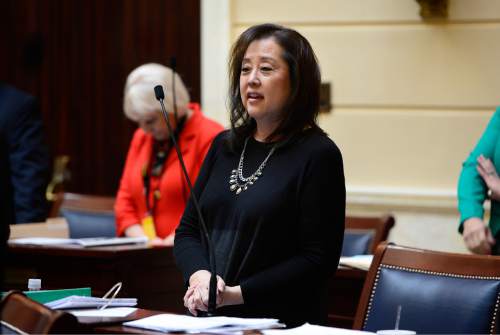This is an archived article that was published on sltrib.com in 2016, and information in the article may be outdated. It is provided only for personal research purposes and may not be reprinted.
Lawmakers advanced a proposal Thursday to start charging a 10-cent fee on single-use plastic and paper bags.
The Senate Business and Labor Committee voted 3-2 to endorse SB196 by Sen. Jani Iwamoto, D-Holladay. It now goes to the full Senate.
"This is an incentive so consumers will hopefully reduce their use of single-use retail bags over time," Iwamoto said. "You don't have to pay anything. You can carry things out. You can bring your own bags with you."
The Utah Association of Counties supported her bill because of problems bags are creating in landfills. The Utah Food Industry was neutral on it.
Sen. Todd Weiler, R-Woods Cross, said he lived in California, where similar fees have been in place for years.
"Most people who don't want to pay a few extra cents for a bag that's going to pollute the environment bring their own bag," he said. "I think Utah needs to look at more of these options to incentivize people to do things that are healthy for the environment."
But Committee Chairman Curt Bramble, R-Provo, said nothing would prevent stores from imposing fees now if they want, or offer other more creative incentives than a fee.
For example, George Chapman, a former candidate for Salt Lake City mayor, testified that some stores already offer rebates for customers who bring their own bag — but said a new statewide fee would halt that.
"This is essentially is a tax increase on food," he said.
Ken Burton, a Weber State University student who lived in Denmark the past two years, testified that stores there charge up to 40 cents per bag. He said it doesn't really reduce use "because you still need them."
But Iwamoto said Ireland, which has imposed such fees for decades, reports that it has cut use of plastics by 93 percent.
Money from the fee would be distributed to county, city and state agencies to promote recycling and address problems caused at landfills by the bags.
The bill would exempt pharmacy bags for prescriptions, laundry bags, newspaper bags, and bags used by nonprofits to carry and deliver food. It also exempts bags used in stores for bulk purchases, and bags used to wrap frozen food, meat or fish.
Iwamoto acknowledged that a strong fight still looms ahead for her bill. But she predicted that if it fails, several cities and counties may impose their own fees. She said her bill started originally to clearly allow permission for local fees.



